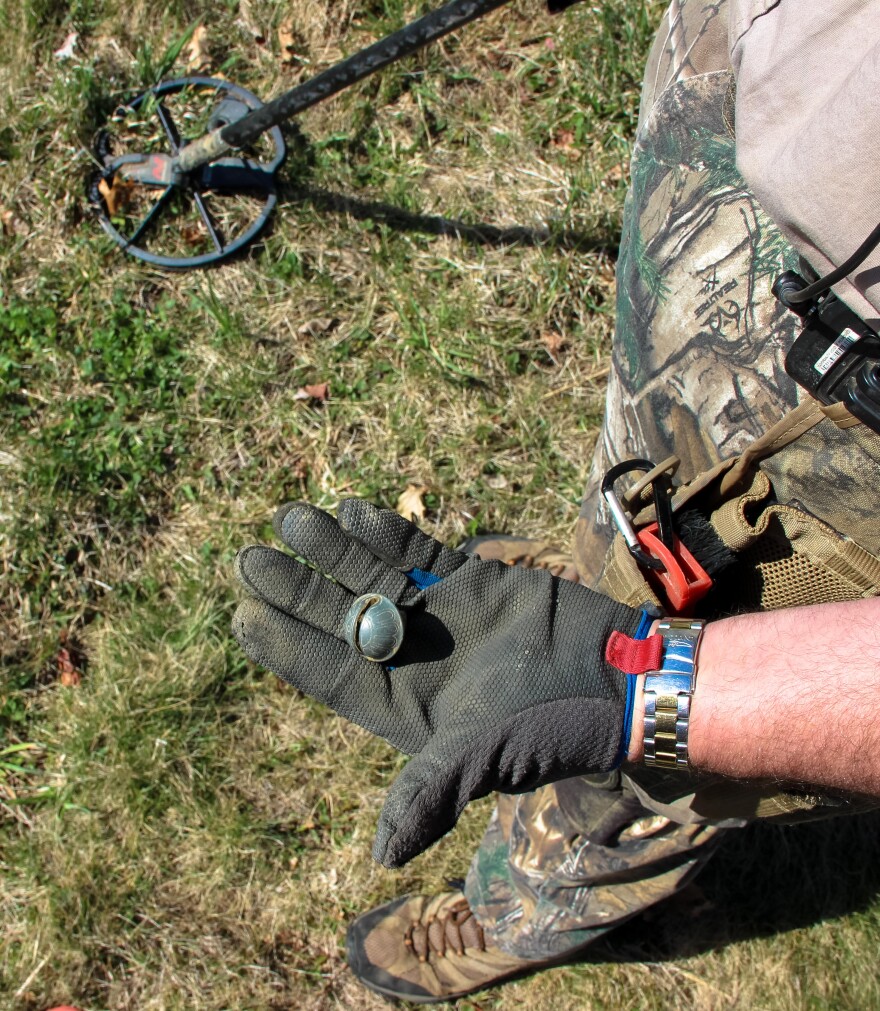For some, the end of winter conjures thoughts of swimming at the lake or working in the garden. For others, the warm weather means it’s time to put fresh batteries in the metal detector.
Retired firefighter Mike Cogan from Long Island hoists a metal detector over his shoulder and heads down the dirt road with 40 other metal detecting enthusiasts from around the country.
“Heigh ho, heigh ho, it’s off to work we go…” Cogan sings.
This is the third day of B.O.N.E. 23, the largest metal detecting meet-up in New Hampshire, and this morning, with the property owner’s permission, the group is scanning a five acre field in Alstead.

Jean Wrisley, from Shelburne Mass, finds a strong signal and is the first one to start digging. “I gotta tell you,” she says, “I’m one that don’t give up.”

Butch Holcomb from Atlanta - and the publisher of American Digger Magazine - says the field the group is hunting once belonged to a colonial era family. “And around Colonial sites,” Holcomb says, “you’ll generally find what they call coppers, which are the old coins, 1700’s coins, about the size of a large cent. You’ll find household items. I found a solid silver thimble my first day here.”
Such coins and thimbles, he says, old as they are, rarely have much value. “I actually figured it up one time,” he says, “in the all the hours that I’ve metal detected, if I was to sell all my finds, it would come out to approximately 2 and half dollars an hour.”
So what’s the draw, I ask? “This is as close as I’ll come to meeting someone that lived 250 years ago," Holcomb replies. "The last person that touched it was a colonial fella. And I call it shaking hands with the past is my own little term I use for it.”
Jean Wrisley reaches a hand into the earth. No colonial fellows reach back. “At first,” she says, “it started like 4 inches, but as I took this plug out it’s down 6 inches. So I gotta keep going. It’s probably a tin can.”
You find a lot of trash, is what they all say. Iron, bits of rust. Old cans and nails. But everything is kept – and all the holes are neatly filled and fixed after each dig.

Mike Cogan drifts his detector over the ground, finds a good signal, and shovels out a plug of grass. “It’s like pulling the handle on a slot machine,” he says. “Boo boo boo boo – the wheels are turning. Oh I got a signal. Oh I’m digging. Goose eggs. It’s another nail. Every now and then, it’s a reward.”
Matt Winchester hits a jackpot of sorts – finding a half penny from 1787. “Directly behind you in the field over here,” he says pointing, “probably about 8 inches deep.”
Stacey Rosoff metal detects her way along a rock wall. “Are you surprised there’s a lot of girls in this hobby?” she asks.
About a quarter of the crowd is female. I ask Rosoff what advice she’d give to someone new to the hobby. “You really should dig everything,” she advises,” especially when you’re learning a machine you should dig every solid repeatable signal. Cause I was doing that – I was digging beer can, beer can, beer can. Then we had a great signal, and I said ‘It’s probably another beer can’. We dug it and it was a sterling baby cup.”

Jean Wrisley sifts through a handful of dirt. “Yesterday,” she recollects, “I found a button really deep. And somebody else said, ‘I never would have dug that thing.’ But I’m a digger. I don’t care.”
Nearby, Chris Redmond brushes earth from a silver sleigh bell found 10 inches down. Moments before and nearby – 11 inches down, he found a coin. “It’s 1700’s,” he says, “probably a King George based on the thinness of it.”

Redmond finds another strong signal, digs, and comes up with a rusty sledgehammer head. He passes it to Jim Doray and Jay Verburg.
“What do you think that is?” Redmond asks, hefting the old iron around.
“That’s a five pounder,” Jim Doray guesses.
But Redmond doesn’t think so.
“Is that like the same weight as a bag of sugar?” Jay Verburg asks.
“No way,” Redmond says, “that’s more than a bag of sugar.”
“You think?” Doray says, “I’ve carried ten pound bags of hamburger, this feels lighter.”
Then Jay Verburg holds it. “It’s like an 8 pound bowling ball,” he says.
And Redmond and Doray agree.
Retired firefighter Mike Cogan looks over the field, the low mountains in the distance, and the forty former strangers he now calls friends. “Look at this view,” he says, “look at the day. Look at the great people who are optimistic in the hobby that you love. So you hang out with people who are little wacky – like yourself. You tell tall tales and it’s all good.”

They may not get rich, they may not find anything, but as Butch Holcomb says, “It’s a very mystic feeling to actually hold something that someone lost 200 years ago.”
Jean Wrisley hasn’t moved. “I’m determined,” she says. “Even if it ends up being a nail. I might have this whole place dug up. I could be here for a while.”






